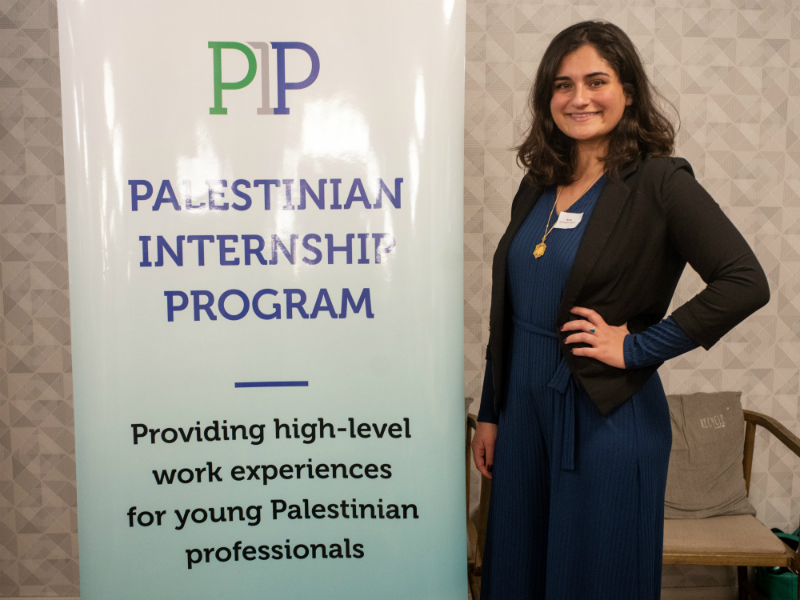Anna Gol has chosen an unusual career path for a Canadian living in Israel. As the program director of the Palestinian Internship Project (PIP), she’s helping Palestinians from Jerusalem and the West Bank start careers in the high-tech sector, creating a space for themselves within Israel’s startup nation economy, or back home in Palestinian society.
In fact, her background seems to have led directly to this position, beginning at Toronto’s TanenbaumCHAT day school, where she was “very invested” in courses about Israeli-Arab history.
After graduating in 2009, she bounced back and forth between Canada and Israel, earning a BA in peace, conflict and justice studies from the University of Toronto’s Munk School of Global Affairs and Public Policy, a master’s in conflict resolution and mediation from Tel Aviv University and working for a boutique recruitment firm for startup and high-tech companies in Toronto.
She then connected with Yadin Kaufmann, the American-Israeli investor and entrepreneur that founded PIP in 2014, who helped her clarify what she was looking for. When a position opened up with PIP in 2017, she moved quickly – quite literally, making aliyah to accept the job.
PIP’s mission resonated with her immediately. Facing a shortage of 10,000 tech workers, Israeli companies are desperately outsourcing work to countries like Ukraine or Indonesia. “We’re saying, why not work with people who are one to two hours away, depending on traffic, who are able to communicate in English, Arabic, and Hebrew?” said Gol.
But that commute isn’t always so simple, since Palestinians often face a number of obstacles, including permits and checkpoints, when they want to travel inside the Green Line for any reason. Among PIP’s tasks is helping interns navigate the bureaucratic hurdles, so they can gain meaningful work experience and familiarize themselves with Israeli society.
Marwan Meqbil, from the Al-Aroub refugee camp near Hebron, was working with tourists in the West Bank, when he got involved with the Center for Emerging Futures (CEF), which brings Israelis and Palestinians together for dialogue.
Meqbil, who holds a bachelor’s degree in information technology from the Palestinian Polytechnic University, was initially cynical. “I went there with a blocked mind,” he said.
That was the first time he had ever encountered Israelis who weren’t soldiers. “They had a different mentality, they were against the occupation, against what soldiers were doing in the West Bank,” said Meqbil. “We would share moments you’d never imagine an Israeli could share with you. I kept wondering: is this real?”
Through CEF, he found PIP and became part of its first internship program. PIP’s internships differ from those that students might encounter during university, Gol explained, as they are paid and are longer than most academic ones. In some cases, PIP provides a stipend, so interns can live closer to their work site and avoid the commute – and the checkpoints.
PIP also offers workshops to help participants improve their job-search skills, but they’re often not necessary: according to Meqbil, who now works as PIP’s program co-ordinator, about 53 per cent of interns keep working at the company where they interned after the program ends; and about five to 10 per cent start their own businesses after completing the program.
Meqbil said most Palestinian students don’t have much hope of working in their field. “Most of the graduates, after they finish their degree, work in Israel for low-wage jobs – restaurants, building, low-level jobs. It’s impossible to imagine you could find something in your field,” he said.
READ: NON-PROFITS, MPS LEAD DISABILITY MISSION TO ISRAEL
The West Bank is home to 14 Palestinian universities. Although a large percentage of the population has a university education, the unemployment rate for grads in the West Bank and Gaza is currently over 55 per cent.
Israeli companies have been very responsive and PIP has now completed seven cycles of internships, placing over 50 interns with 30 companies, including leading businesses like Intel, Freightos, Thomson Reuters, HP and Teva, as well as a number of start-ups and venture capital firms.
Unfortunately, PIP has recently taken a major blow with the cut of U.S. funding to Palestinian programs in the West Bank, a result of Anti-Terrorism Clarification Act of 2018. “Prior to this year, we were solely funded by MEPI, a project of the U.S. State Department,” said Gol. Several other programs have also been affected.
The global Jewish community, on the other hand, has been generous in its support. PIP’s two major funders are large private Jewish foundations in the U.S. – the Charles and Lynn Schusterman Family Foundation and the Jacob and Hilda Blaustein Foundation.
Gol believes that most Jews, whether in Israel or abroad, realize that a strong Palestinian economy, with desirable job opportunities for university grads, can only benefit Israel by helping create stability in the region.
“Jews and Jewish communities and Jewish foundations are interested in PIP because we’re an apolitical organization,” Gol said. “We are focused on economic development and economic co-operation within the Israeli tech sector and the Palestinian tech sector.”
Although Meqbil realizes that some Palestinians still oppose “normalization,” meaning granting legitimacy to the status quo with Israel through this type of co-operation, he insists that PIP isn’t about politics, but about “creating a future together.… In the end, it benefits both sides.”
His approach is pragmatic: “I don’t care who you are, I don’t care where you’re from, I don’t care which religion you follow. If you interact with me as a person, I will respect you. If not, I will ignore you. In the end, we’re all human and we have to interact with each other as humans.”
